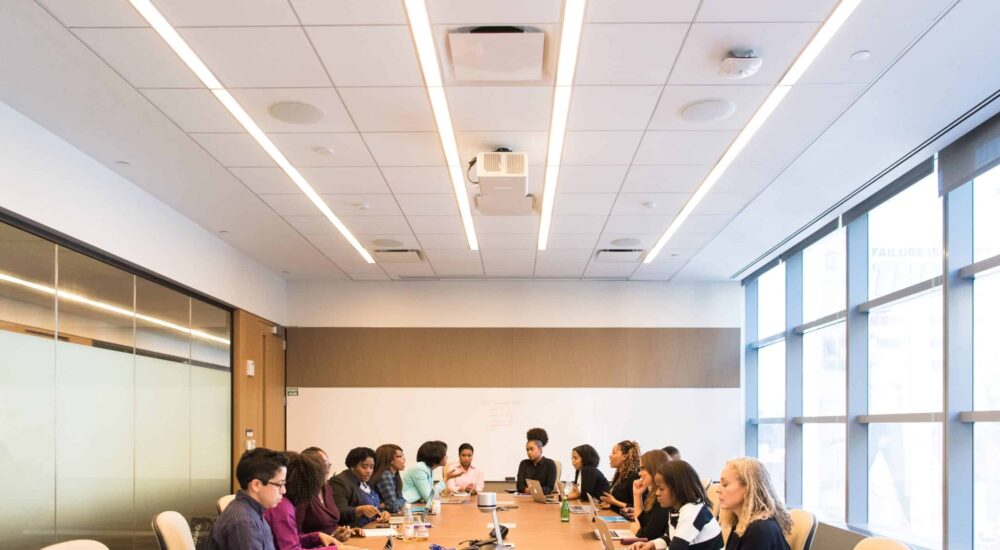Our boardrooms are evolving. We are moving away from homogeneity towards what is slowly become a thriving and increasingly diverse and inclusive boardroom table. The last few years have provided a number of learnings for senior leadership teams and taking the time to consider how a board ‘thinks’ and ‘works’ is a crucial element of change management today.
We take a look at the practical measures the boardroom can take to evolve and enhance their ways of working; the focus being on purpose, strategy and reputation, stakeholder management, environment, social and governance, business transformation and the future of work.
Purpose, strategy, and reputation
The core focus here is to maintain the company’s value to all stakeholders and to build trust that positions them well, regardless of external events and unpredictable changes. An organization’s purpose and values continue to be increasingly more critical, with social justice issues and employee wellbeing becoming priority in today’s workplaces.
Hand in hand with this is the need to develop a strategy that is resilient and adaptable, to safeguard the reputation of the company. Business leaders can no longer ignore that their teams must be flexible, responsible, and inclusive in order to create thriving businesses that are representative of their communities.
One way that organizations can build inclusive and resilient teams is to seek external support from D&I experts and consultancies who offer digital trainings and inclusion solutions to help businesses become strong, adaptable, and fit for the future.
Stakeholder engagement
Boards need to maintain a two-way dialogue with all stakeholders, understanding the range and nuance of perspectives available. In some cases, we have been seeing Non-Executive Directors (NEDs) being brought in to oversee projects, making use of their independent insight across a range of different departments.
Conversations between stakeholder groups, shareholders and employees with the board are occurring more frequently (and with greater ease) as a result of a shift to remote working. This means that firms are becoming better placed to listen to, and take action on, a range of core issues, from risk management and investment opportunities, to understanding the lived experiences of their employees.
Environment, Social and Governance (ESG)
Firms are taking the time to consider how they can do better in all aspects of ESG, particularly accelerating climate and social justice.
In particular, boards need to focus on risk and building a resilient organization that pays attention to social justice and equality, setting targets to create more fundamental cultural change. Employees will seek positions in a business that acts on their commitments, and that has subcommittees and networks in which to amplify a range of voices.
It’s vital to effect change from the top and boards could employ inclusion benchmarking tools to assess their organization’s position in relation to inclusion and to give specific insights into the real-life experiences of their employees across diverse characteristics. Our sister company, INvolve, employs RADAR, a tool that can provide a baseline from which organizations can build upon their inclusion initiatives sustainably.
Business transformation
Boardrooms need to assess their strengths and weakness when it comes to transformational change, identifying whether they have the right talent in place to keep pace with ongoing external change. Many companies have demonstrated agility and innovation when under pressures brought about by the pandemic, and there is concern that governance may override this as we look to the future.
Leaders need to evaluate the threats and opportunities posed by digital transformation, supply chain management and organizational agility. They should now consider encouraging their executive team to rethink their operating model to align with the changes the business has seen and will see in the coming months.
A newly established, but vital role that your business could benefit from is that of a Chief Diversity Officer (CDO). CDOs exist to transform a business and bring it into the modern world, with a focus on streamlining inclusive practices across all levels of the business. See how a CDO could strengthen your business here.
Future of work
Transitioning to remote working has tested the agility, resilience and capability of employees and their organizations, and has been successful in a range of industries across the globe. The future of work, and even whether the traditional concept of a workplace is needed any more, is now widely being discussed.
For the evolving boardroom, the challenge now lies in ensuring the management team rethink the optimum conditions for workforce wellbeing and productivity, and to challenge preconceptions about notions of workplace. Business leaders have spent more time in a remote working environment focusing on the unique requirements of the individuals in their companies and ensuring this remains a priority when considering what the future workplace looks like.
Management teams have adapted their agenda to make enhancements to their financial and operational processes. In taking the time to think about the clarity of the mission of the business in the months to come, the board can ensure they are prepared to act decisively and with integrity, no matter what disruption external factors may cause.
To discuss how we can help you change and adapt your boardrooms, get in touch.
